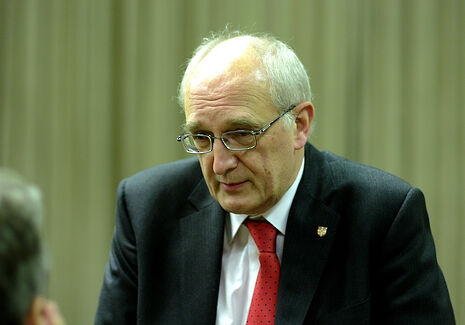VC stresses importance of ‘partnership’ in start of term address
Vice Chancellor of the University, Leszek Borysiewicz, gives annual address marking beginning of term

Professor Sir Leszek Borysiewicz, the Vice-Chancellor of the University of Cambridge, emphasised the theme of ‘partnership’ in his annual 1st October address at the Senate House on Thursday.
The event, at which university proctors were also elected, marks the first official day of Michaelmas term and offered the Vice-Chancellor an opportunity to reflect on the year that has passed, as well as looking forward to the coming year.
Reflecting on the past academic year, he paid tribute to the way in which the university had adapted to new challenges such as the Office for Fair Access targets for widening participation in admissions.
He noted that the university’s intake was “at its most diverse, with state sector and minority ethnicity admissions at a 30-year high” which had been achieved “without compromising standards”.
Evoking British statesman and political philosopher Edmund Burke, Borysiewicz described how the university strived to serve society as “the most important partnership of all” and highlighted the essential continuity of the university’s efforts to serve “the whole of mankind” in the past, present and future.
The Vice-Chancellor also spoke about partnerships for “knowledge creation”, such as the newly-founded Alan Turing Institute, of which Cambridge is a leading partner alongside Edinburgh, Warwick, UCL and Oxford.
He addressed partnerships with industry, such as Cambridge’s links to pharmaceutical firm AstraZeneca as part of the provision of 80 PhD scholarships and eight clinical lectureships over the next five years.
The address underscored the university’s commitment to international partnerships in order to “jointly tackl[e] some of the major challenges we face”, referring to the ongoing refugee crisis to demonstrate that “there has never been a more vital time for this point to be made”.
Borysiewicz referred to the university’s provision of postgraduate scholarships for students from sub-Saharan Africa, claiming that these places constituted an investment in “the leaders of the future – in research, in industry, in government and in civil society”.
He continued: “This is a real investment for the future, and a clear example to me of what partnership is about”.
The Vice-Chancellor also spoke about the importance of philanthropy to the provision of long-term stability in the face of political upheaval in the higher education sector, enabling the university to “tackle the many problems that beset society”.
 Features / Should I stay or should I go? Cambridge students and alumni reflect on how their memories stay with them15 December 2025
Features / Should I stay or should I go? Cambridge students and alumni reflect on how their memories stay with them15 December 2025 News / Cambridge study finds students learn better with notes than AI13 December 2025
News / Cambridge study finds students learn better with notes than AI13 December 2025 Comment / The magic of an eight-week term15 December 2025
Comment / The magic of an eight-week term15 December 2025 News / News In Brief: Michaelmas marriages, monogamous mammals, and messaging manipulation15 December 2025
News / News In Brief: Michaelmas marriages, monogamous mammals, and messaging manipulation15 December 2025 News / Uni Scout and Guide Club affirms trans inclusion 12 December 2025
News / Uni Scout and Guide Club affirms trans inclusion 12 December 2025










